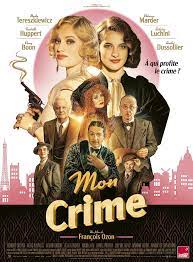
MON CRIME/ THE CRIME IS MINE
France, 2022, 104 minutes, Colour.
Nadia Tereszkeiwicz, Rebecca Marder, Isabelle Huppert, Fabrice Luchini, Dany Boon, Andre Dussolier, Edouard Sulpice.
Directed by François Ozon.
The original intention was to indicate the tone of prolific director, François Ozon’s, latest film was to find a French vocabulary equivalent to say that this was a “hoot”. However, Google was able to supply the equivalent of a car horn (the not particularly Gallic ‘klaxoner’) or the cry of an owl. Nevertheless, the point is made, Mon Crime is a French hoot.
Ozon has gone back to a theatrical piece from 1934, keeping its setting, costumes and decor, quite a period piece. And, it is very French in its eccentric characters, some arch behaviour, a lot of farce, humorous dialogue and satire. And, it has a cast to match, two leading ladies, one an aspiring actress who achieves her aspirations via a very suspicious ladder, the other her roommate, a prosecutor. But there are some veterans of French cinema who steal the moments they find themselves in: Fabrice Luchini is a pompously humourless judge, Dany Boon, an aspiring entrepreneur, Andre Dussolier as a vehicle tyre tycoon. But, when she appears in the middle of the film, Isabelle Huppert who has shown for over 40 years that she can excel in any role, comic, tragic, and in between, suddenly swoops into the plot, looking like the Madwoman of Chaillot, performing as if she is trying to outdo Sarah Bernhardt. Mon Crime is worth seeing just for Isabelle Huppert.
The plot is farcical in the realistic sense as well as in the comic sense, a murder, a most eccentric court case with speeches that might not have been made in 1934. Ozon himself in an interview refers to the film about the “sorority”. In more recent times this would have been referred to as #Me Too. Bullying and abusive males are definitely a target.
Lies and deceptions are staple for this kind of story. And there are some amusing twists as how the lies are exploited, in the court, when the truth is exposed, in financial wheedling and arm-twisting for cover-ups. And, when the aspiring actress has achieved theatrical status and reputation, a final sequence of the play before the curtain comes down, two women, a gun, and an abusive male.
For audiences not quite expecting what is to come, give the film 15 minutes or more to introduce the two young women, find out about the murder – and then surrender to the twists and absurdities and comic consequences which follow.
- The title, ironic, the murder, the claims?
- Based on a 1934 play, keeping the situation, 1934, costumes and decor, the theatre? Performance? The tone, comic, farcical, ironic, serious undertones?
- The film is realistic, as stylised? Characters, situations?
- Introduction to the two women, the aspiring actress, the aspiring lawyer, sharing the apartment, the landlord wanting the rent, their playing him?
- The situation, the death, Madeleine, the long walk home, the response of Pauline? The producer, womanising, violent death?
- The court case, the judge, his personality, serious, the discussions, irony about his approach to the case? His assistant? The court case, the prosecutor and his bombastic tone, Pauline for the defence, Madeleine in the dock, the witnesses, the cross-examination, the variety of speeches, Madeleine, impassioned? The crowd in the court room, listening, laughing, applauding? The money, not stolen, found?
- The verdict, Madeleine’s crime, the reporting, the office, the play, audition, getting the part? Her reputation, the couple having more money, moving house, more lavish lifestyle?
- The character of Palmarade, money issues, the dead man, and her, the visits to the women, the attraction, the dead man and the debt, his getting all the money?
- Andre, with Madeleine, rich, not working, Madeleine urging him to work? His planning to marry the rich woman, very serious, not realising the ironies?
- The arrival of Odette, Isabelle Huppert and her performance, appearance, style, beyond Sarah Bernhardt? Claiming the killing? The threat to Madeleine and her reputation?
- The plan, going to Andre’s father, the financial situation, his disdain towards Madeleine, changing his mind, the encounter with Odette, his reputation and his son’s marriage, Odette and the money? His agreeing to the plan?
- The finale, Odette running along the road, joining with Madeleine, on stage, their both shooting the dead man?
- The 1930s play and characters, issues, but a 21st-century tone of irony, farce, and feminism?